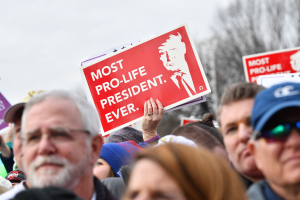Would the Equal Rights Amendment threaten religious liberty?

A renewed push for the ratification of the Equal Rights Amendment has led to concerns that the measure would curb religious freedom.
The much-debated amendment states that “Equality of rights under the law shall not be denied or abridged by the United States or by any State on account of sex.”
However, some have expressed concern how this amendment will be interpreted, especially in regards to issues like religious liberty and abortion.
Mat Staver, founder and chairman of the Liberty Counsel, told The Christian Post that he believed the ERA would “absolutely” threaten religious liberty if passed.
Staver believes that if the ERA is passed, it could “be used as a hammer against religious organizations including churches to provide abortion or abortion-inducing drugs or devices.”
“I think also the ERA now would include an LGBT agenda that would conflict with churches and religious organizations with respect to biblical doctrines and beliefs of male and female in uniquely created and complementary sexes,” added Staver.
“So I think in both the abortion area and in the LGBT arena, the ERA Amendment would be a direct assault on religious liberty, against religious organizations and churches.”
Staver also told CP that his organization and others are “going to watch and see what kind of traction it gets,” noting that “we would definitely be opposed to it.”
The Virginia Catholic Conference also expressed concern over the ERA, warning that, if passed, the amendment would have “unintended consequences.”
“Legal challenges and uncertainty would arise over the lawfulness of programs and facilities that serve and assist women exclusively,” stated the Conference.
“The ERA at first glance appears to be a neutral measure advocating for the equality of women which is a worthy endeavor; however, the ambiguity of the language disguises significant negative consequences and legal uncertainty particularly when it comes to protecting the unborn.”
The ERA traces its history back to 1923, when women’s rights activist Alice Paul first introduced the amendment, then known as the "Lucretia Mott Amendment."
In 1972, Congress passed the ERA and sent it to the states for ratification with a seven-year deadline and then an extension to 1982. When the deadline hit, the ERA failed to get the necessary 38 states for ratification by three states.
Conservative religious groups have been critical of the ERA, warning that it could be used to undermine the distinctions between men and women found in Scripture.
For example, in 1980 the Southern Baptist Convention adopted a resolution that, while urging employers to “seek fairness for women in compensation, advancement, and opportunities for improvement,” also denounced the ERA.
“… this Convention, reaffirming the biblical role which stresses the equal worth but not always the sameness of function of women, does not endorse the Equal Rights Amendment,” concluded the resolution.
Recently, the effort to pass the ERA experienced a resurgence, with the Nevada Legislature approving the ERA in 2017 and Illinois’ legislative branch doing so last year.
Earlier this month, the Virginia Senate approved the ERA. A Virginia House of Delegates subcommittee voted against the measure on Tuesday. However, it could still go to a full Privileges and Elections Committee vote.
Krista Joy Niles of the Alice Paul Institute, which supports the ERA, told CP that there was indeed “a renewed push for the federal ratification of the Equal Rights Amendment,” adding that “several states have been very active in moving the ERA forward for state ratification.”
Niles directed CP to a 2018 Frequently Asked Questions paper which noted that the “time limit on ERA ratification is open to change,” meaning that the previous 35 states that approved the ERA can still count as part of the ratification process.
“Congress may be able to accept the validity of state ratifications that occur after 1982 and keep the existing 35 ratifications alive,” according to the FAQ paper.
“Five states – Idaho, Kentucky, Nebraska, Tennessee, and South Dakota – have attempted to withdraw their approval of the Equal Rights Amendment. However, according to precedent and statutory language, a state rescission or other withdrawal of its ratification of a constitutional amendment is not accepted as valid.”
When asked by CP about the concerns some have about the ERA being used to curb religious liberty, Niles responded that these concerns were unwarranted.
“Religious freedom in the United States is a constitutionally protected right. The Equal Rights Amendment will have no negative impact upon those protections,” continued Niles.




























